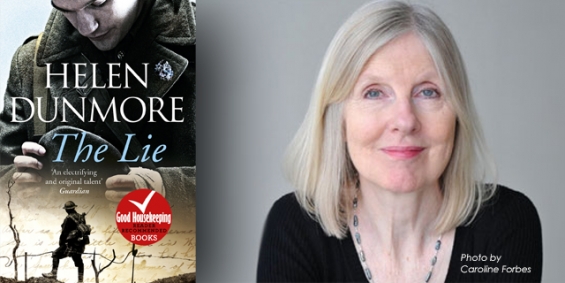Helen will be taking part in the Walter Scott shortlist discussion event at the Borders Book Festival on Saturday 13 June at 3.15pm
You can also see Helen at the Walter Scott Prize award ceremony on Saturday 13 June at 5.15pm

7th May, 2015
What do you think about being shortlisted for the Walter Scott Prize for Historical Fiction? Do you see yourself as a historical novelist?
I am delighted, of course. This prize has had very interesting shortlists since it began. I’m not sure that it is the task of the writer to define his or her work: that is for the reader. However, it’s the case that some of my best-known novels, such as The Siege, The Betrayal and The Lie are set within defined historical periods and draw on a lot of historical research.
The Judges were struck by your brilliant evocation of the aftermath of war. Was it your intention to focus on this?
Yes, it was. We think of war as giving way immediately to peace and technically it does. But there may be a third state of aftermath: a no-man’s land in itself, where returning soldiers struggle to fit back into a ‘home’ which now seems strange to them and where those who are bereaved try to cope with the absence of those they love. I think of a comment written in Cynthia Asquith’s diary in 1918, when she realises that it is only now, when the war is ending, that the finality of loss comes home: ‘the dead are not only dead for the duration of the war.’ For Daniel Branwell, my central character, the war is not over and he cannot escape its repercussions. He is an entirely an individual, but also part of a generation which was shaped by war.
How do the people and times you write about first lodge in your imagination?
In the case of The Lie it was the character of Daniel which first came to me, insistently and vividly. It was as if this character were standing in front of me, challenging me to uncover his history. Or, perhaps, demanding that the story be told. The triangle of Felicia, Frederick and Daniel slowly took shape, and their childhood and youth unfolded in my imagination. So much is destroyed by the war, and what remains is transformed. I wanted to explore the loneliness of the survivors, who must now fend for themselves. Felicia is a widow and the single mother of a small child by the time she is twenty, with no-one to depend upon and the rest of her life ahead of her. There is no obvious pattern for her to live by any more. She must discover one for herself, just as Daniel struggles to find a way to survive in the postwar world. Frederick is not always present but he is always essential to the novel, because he preoccupies the imaginations of the main characters. Daniel cannot let go of him. For Daniel, the trauma of war has dissolved the boundaries between past and present, living and dead.
At which point do you let fiction take over from fact?
Essentially I am writing fiction: narrative and character preoccupy me from the first page. I do a great deal of research but want it to become so deeply absorbed into the novel that it is not obtrusive. Research that calls attention to itself makes for poor fiction.
Helen Dunmore’s book The Lie is published by Hutchinson.
Helen will be taking part in the Walter Scott shortlist discussion event at the Borders Book Festival on Saturday 13 June at 3.15pm
You can also see Helen at the Walter Scott Prize award ceremony on Saturday 13 June at 5.15pm